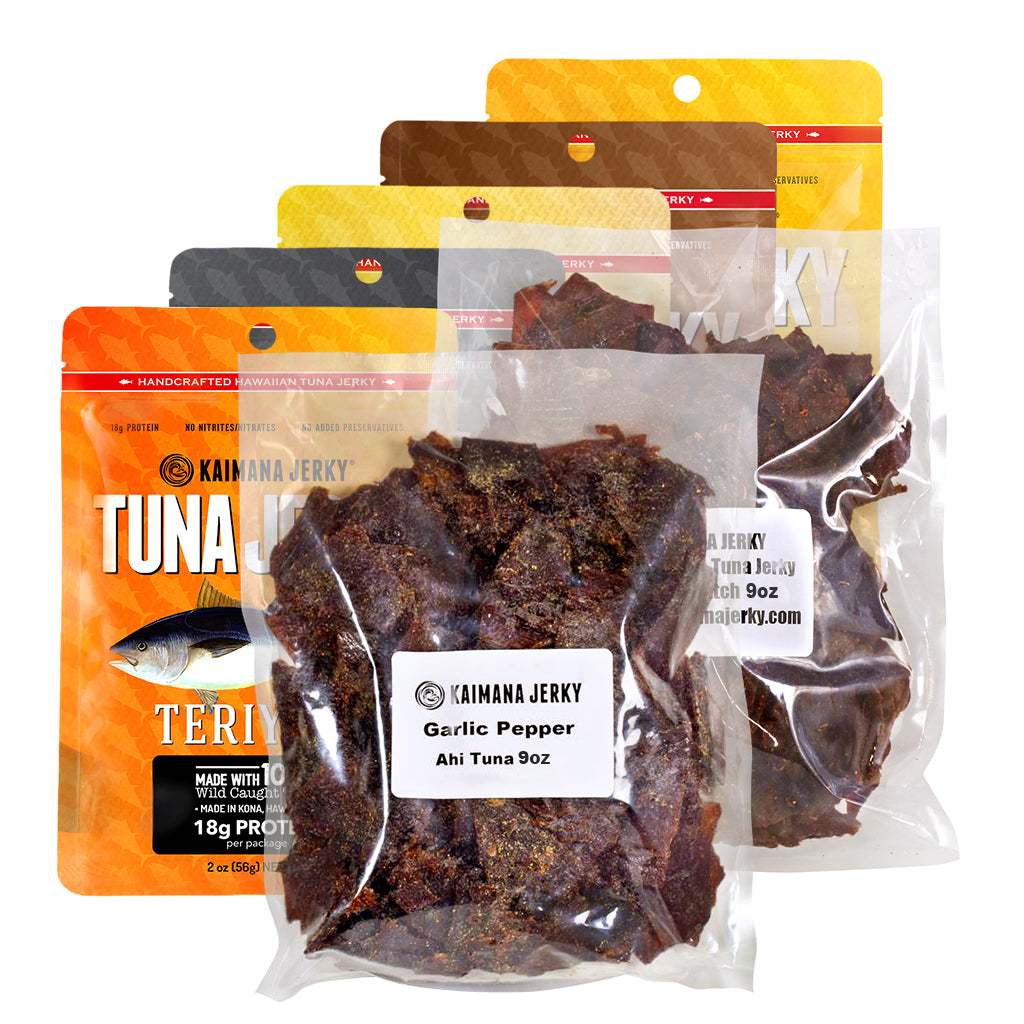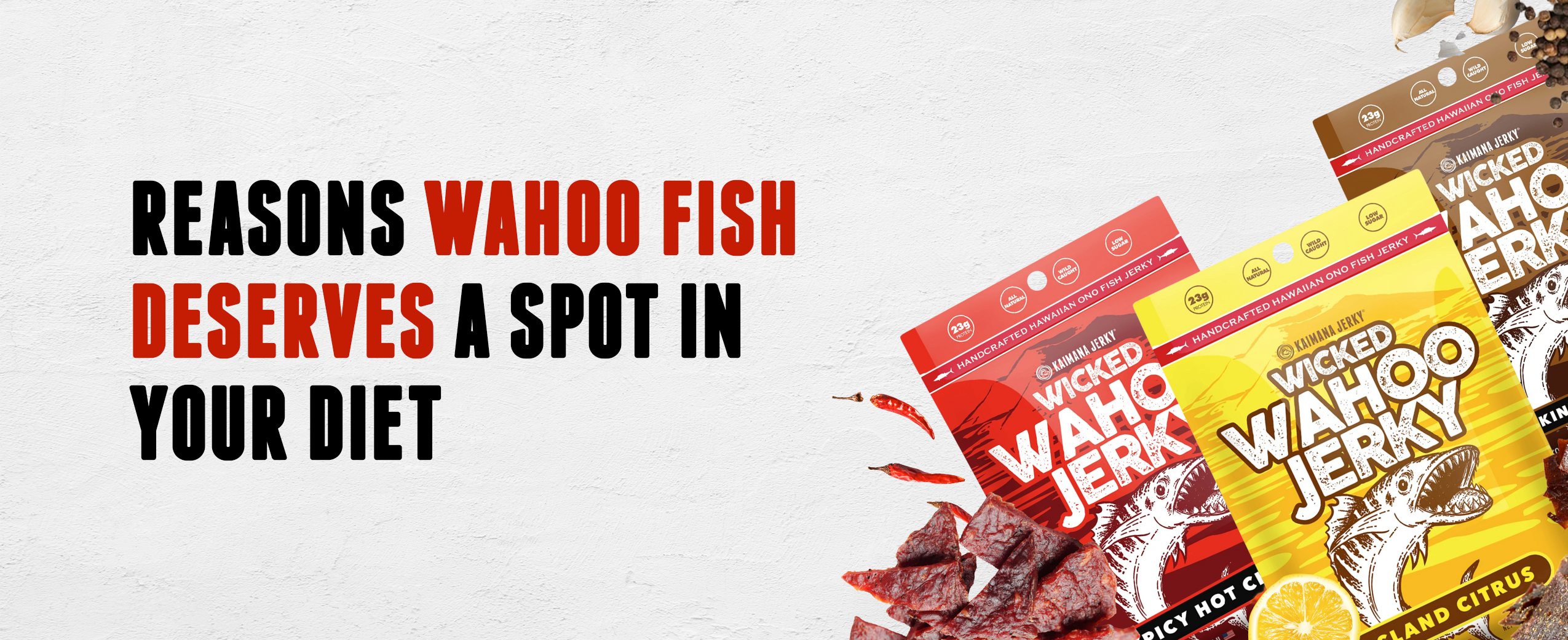What is a pescatarian?
A pescatarian is someone who follows a primarily plant-based diet but includes fish and seafood as their main source of animal protein. This way of eating is a middle ground between vegetarianism and a traditional omnivorous diet.
Is a pescatarian diet healthy?
Yes, the pescatarian diet is considered very healthy when well-balanced. It emphasizes whole foods like vegetables, legumes, grains, and healthy seafood, which provide essential nutrients such as protein, omega-3 fatty acids, vitamins, and minerals. It’s also been linked to reduced risk of heart disease and better weight management.
What do pescatarians eat?
Pescatarians eat a wide variety of foods including vegetables, fruits, legumes, whole grains, dairy, eggs, and most importantly, fish and seafood. A typical pescatarian food list may include tuna, salmon, shrimp, scallops, beans, tofu, leafy greens, and nuts. Many also enjoy fish jerky or seafood snacks as convenient, high-protein options.
Do vegetarians eat fish?
No, traditional vegetarians do not eat fish. A vegetarian that eats fish is actually considered a pescatarian, as they incorporate seafood into an otherwise plant-based eating pattern.
Do pescatarians eat eggs?
Yes, many pescatarians include eggs in their diet. Like dairy, eggs are optional and vary by individual preference, but they are a common part of many pescatarian meal plans due to their high protein content.
Is fish jerky a good snack for pescatarians?
Absolutely! Fish jerky is a great on-the-go snack for pescatarians. It's high in protein, low in carbs, and rich in omega 3 rich foods. It’s also shelf-stable and easy to include in your pescatarian meal prep or snack rotation.
Can you lose weight on a pescatarian diet?
Yes, many people experience pescatarian weight loss results due to the focus on lean proteins, fiber-rich foods, and low-calorie meals. Following a structured pescatarian weight loss meal plan can help with appetite control and fat loss, especially when combined with regular activity.
What’s the difference between vegetarian and vegan diets?
Vegetarians avoid all meat and fish but may include dairy and eggs. Vegans avoid all animal products, including meat, fish, dairy, eggs, and honey. In contrast, the pescatarian diet includes fish and seafood, and sometimes dairy and eggs, but no red or white meat.
Is the pescatarian diet right for you?
The pescatarian lifestyle is ideal for those who want to reduce meat consumption without giving up animal-based protein. It’s flexible, heart-healthy, and sustainable - perfect for people who prioritize wellness, environmental impact, and variety in their meals.
What do pescatarians eat in a day?
A typical day might start with a pescatarian breakfast like eggs and avocado, followed by a lunch of a tuna salad or grilled shrimp bowl, and dinner featuring baked salmon with veggies. Snacks could include Greek yogurt, nuts, or seafood snacks like dried ahi tuna.
Is pescatarian considered vegetarian?
No, although both diets focus on plant-based foods, pescatarians eat fish and seafood, which excludes them from the traditional vegetarian category.
Can pescatarians eat dairy and eggs?
Yes, many pescatarians choose to include dairy and eggs in their diet, although this is based on personal preference. These foods are common in many high-protein pescatarian meals and help round out a nutrient-dense diet.
What are the best protein sources for pescatarians?
The top pescatarian protein sources include fish (like tuna, salmon, and cod), shellfish (shrimp, scallops), eggs, dairy, legumes, tofu, tempeh, and nuts. Fish jerky is another great source of protein on the go.
Can you build muscle on a pescatarian diet?
Yes, with proper planning. The pescatarian diet provides ample protein from fish, eggs, legumes, and dairy, making it suitable for muscle growth when combined with strength training.
Is a pescatarian diet good for heart health?
Definitely. Regularly eating omega 3 rich foods like salmon, sardines, and mackerel helps reduce inflammation, improve cholesterol levels, and lower the risk of heart disease.
How often should you eat fish on a pescatarian diet?
Most nutritionists recommend eating fish at least 2–3 times per week. A mix of fatty and lean fish ensures a good intake of omega-3s and other key nutrients without overexposure to mercury.
What snacks can pescatarians eat?
In addition to traditional plant-based snacks, pescatarians can enjoy seafood snacks, fish jerky, hard-boiled eggs, roasted chickpeas, yogurt with fruit, and avocado toast with smoked salmon.
What’s the healthiest fish for a pescatarian diet?
Salmon, sardines, and mackerel are among the healthiest choices. They are rich in protein and omega-3 fatty acids, making them perfect for a healthy seafood diet.
Can a pescatarian diet reduce inflammation?
Yes, the pescatarian diet is naturally anti-inflammatory due to its emphasis on fruits, vegetables, and omega 3 rich foods like salmon and tuna.
What kind of seafood should pescatarians avoid?
Pescatarians should limit high-mercury fish like swordfish, king mackerel, and tilefish. Choosing sustainable seafood and rotating fish types helps reduce exposure to toxins and supports ocean health.
Can kids follow a pescatarian diet?
Yes, children can thrive on a well-planned pescatarian diet. It provides essential nutrients like protein, omega-3s, and iron. Just ensure meals are balanced and age-appropriate, with guidance from a healthcare professional.
Is the pescatarian diet good for weight loss?
Yes, many find success with pescatarian weight loss due to the diet's emphasis on nutrient-dense, low-calorie foods. It's easier to sustain than restrictive diets, especially with a customized pescatarian weight loss meal plan.
Can a pescatarian diet help reduce belly fat?
A balanced pescatarian diet focused on lean protein, fiber, and healthy fats can support fat loss, including around the midsection. Regular meals, smart snacking, and portion control all play a role.

























